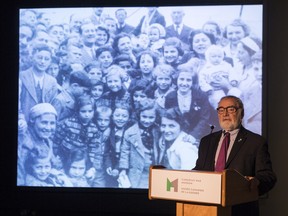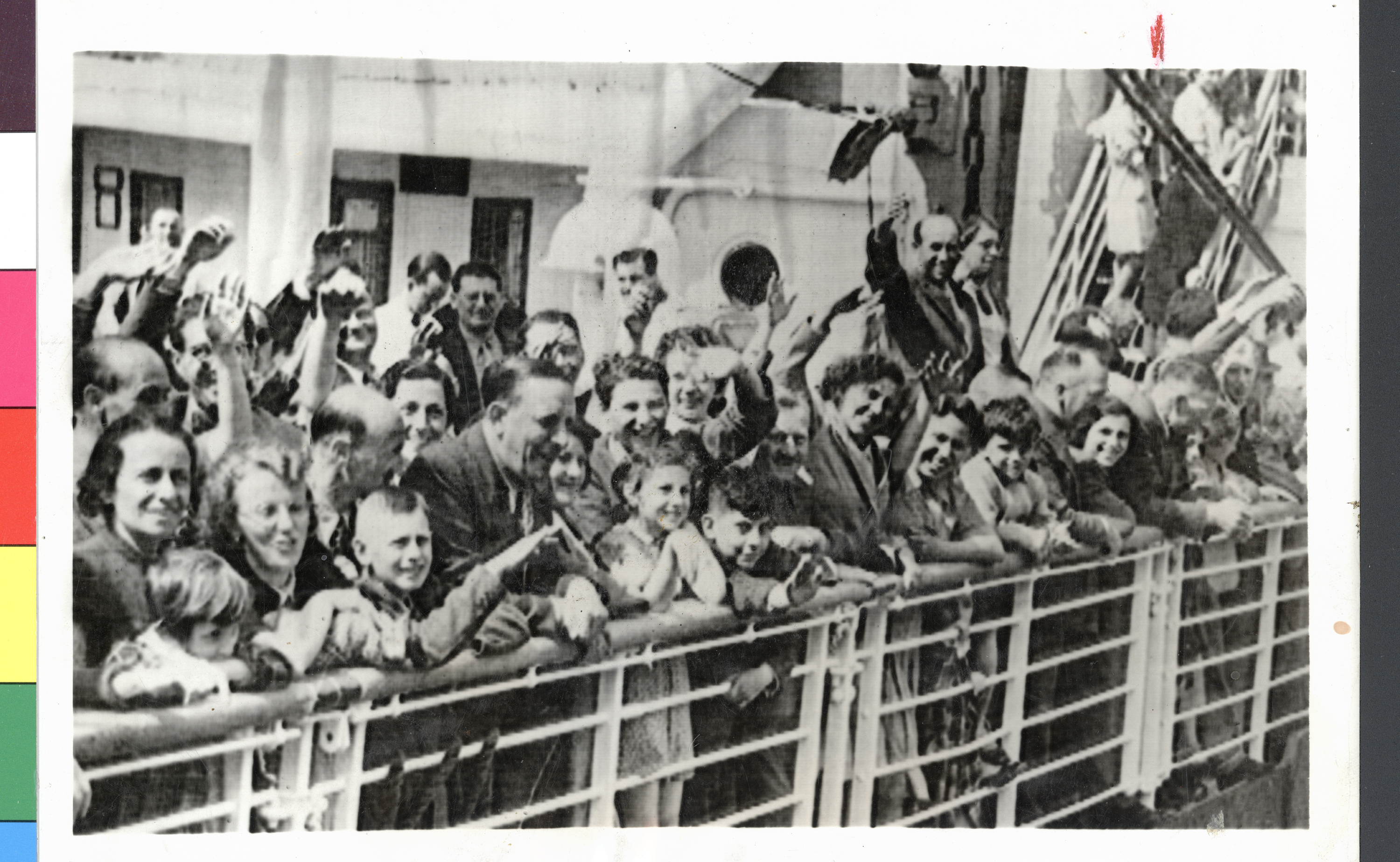May His Memory Be As A Blessing
"Irving Abella was a quintessential Canadian Jewish leader.""He was wise, articulate, engaging, bold and forward-thinking. His inspirational leadership has become his legacy.""For me, he was my mentor and teacher. May his memory always be for a blessing."Bernie Farber, former CEO, Canadian Jewish Congress, chair, Canadian Anti-Hate Network
 |
| Irving Abella, Professor Emeritus, York University. speaks during the media preview of St. Louis – Ship of Fate at the Canadian War Museum. in March, 2018. Photo by Errol McGihon /Postmedia |
During
the Second World War and the Holocaust years, Canada, like many other
free and democratic countries was no friend of the diaspora Jewish
community in their worldwide dispersal, nor where Jews made their home
in Canada. Undeniably, Canada was a typical European-centric racist
society at the time. Canadian hostility and distrust of and unequal
treatment of Blacks, Indigenous, Chinese, Japanese and Jewish
communities within Canada was inhumane in denying them equality within
the larger community.
Irving
Abella -- who at age 82, after a distinguished life as a scholar,
historian, academic, author and activist died following a long illness
-- wrote a seminal accounting of Canada's record during the most
anguished period of Jewish existentialism. It was thanks to his
revelations of Canada's dire shortcomings in humanitarianism and his
urging of later governments in Canada to aid people fleeing the spectre
of group-targeted death due to ideology, religious persecution, conflict
that a turnabout occurred.
Writing
an accounting of Canada's war-time response to the desperate pleas of
Jews attempting to escape the genocidal schemes of Nazi German, Irving
Abella co-wrote None is Too Many: Canada and the Jews of Europe 1933 - 1948,
with co-author Harold Troper. Revealing details of the forgotten
episode of Canada's anti-immigrant stance at a time when Jews were
viciously persecuted by a horrendous group death threat now known as the
Holocaust which claimed six million European Jewish lives.
Canada
-- during the years 1933 when the German Nazi party rose to power, and
1948, when the state of Israel was created -- accepted a mere five
thousand Jewish refugees to enter the country, described as the "worst record of any nation in the world".
In 1939, the German ship MS St.Louis with almost a thousand desperate
Jewish refugees aboard hoping to find refuge from Nazi genocidal
intentions was refused docking privileges in one country after another,
nor were those on board given entry to Canada.
![Refugees aboard the "St. Louis" wait to hear whether Cuba will grant them entry. [LCID: 44112]](https://encyclopedia.ushmm.org/images/large/b62994ed-39e4-42b1-8359-98ca5aec22bb.jpg) |
An
official in the government of Prime Minister William Lyon Mackenzie
King at the time, Frederick Blair, responsible for the government's
immigration portfolio, rejected appeals by Canadian leaders to permit
the ship to dock in Halifax. Blair's blatant and blistering distaste for
Jews was in evidence as the architect of restrictive immigration
policies, and had the imprimatur of the Liberal government of William
Lyon Mackenzie King.
 |
| 'Refugees aboard the St.Louis as they arrive in Belgium in 1939. Courtesy American Joint Distribution Committee |
The
book detailing events of Canada's response to the dire situation facing
European Jews and the government's refusal to admit entry to any
attempting to escape their fate became "an ethical yardstick against which contemporaneous government policies are gauged".
Former immigration minister Ron Atkey in the late 1970s was sent an
advance copy of some of the book's chapters at a time when the country
was debating how it might react to the crisis of Vietnamese refugees,
known as Boat People.
Reading
details of the former government of Canada's lack of humanitarian
decision-making to give aid to the Jews of Europe, Immigration Minister
Atkey decades later saw to it that Canada welcomed tens of thousands of
new citizens, the very Boat People whose plight faintly echoed that of
Jews during World War Two, desperate to find haven. At the opposite side
of the ledger, Irving Abella found it contemptible that postwar Canada
accepted thousands of Nazi collaborators and war criminals.
 |
| Waffen-SS Division "Galicia" was formed by the Nazis in order to support the falling regime. The Ukrainian Central Committee supported this idea with enthusiasm despite the cost of collaboration with the totalitarian regime and its criminal nature. |
Members
of the Waffen-SS Galicia Division, Ukrainian fascists who found common
cause with the Third Reich's aspirations -- as nationalists and fascists
themselves. Ukrainian fascists who shared the Third Reich's contempt
for Jewish lives and lent themselves to rounding up and murdering Jews
as an assigned duty they found quite acceptable to their own core racist
values.
In
stark contrast to the locked gates-of-entry Jews found looking for a
home in Canada, Irving Abella pointed out that entry to Canada was
relatively straightforward for SS members. Their trademark tattoo
indicating their anti-communist sentiments worked in their favour. As a
professor at York University, Irving Abella spent his career teaching
history, holding the position of Shiff Professor of Canadian Jewish
History at the conclusion of his teaching career.
He
was married to Rosalie Silberman Abella, former Supreme Court of Canada
justice, the first Jewish woman and first refugee to sit on the Supreme
Court of Canada. Irving Abella held honours making him a member of the
Order of Canada and a member of the Order of Ontario as well as being a
fellow of the Royal Society of Canada; awarded the Queen Elizabeth II
Golden Jubilee Medal in 2002.
Labels: Academic, Author, Canadian Jews, Intellectual, Irving Abella, Rights Activist, Scholar
0 Comments:
Post a Comment
<< Home